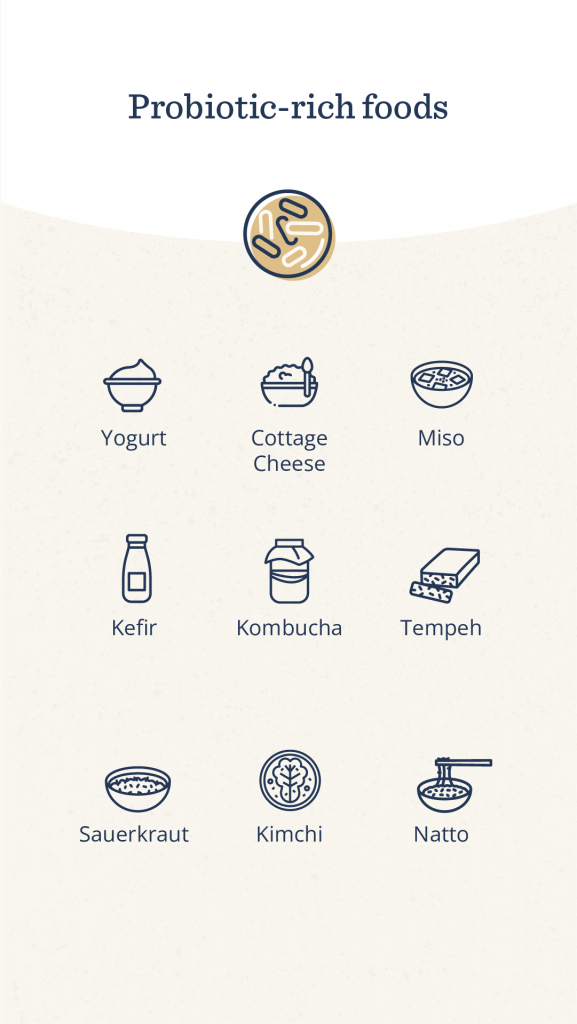With fall and winter right around the corner, a healthy immune system is a top priority for many of us. Vitamin C and zinc are often touted as the kings of immunity, and while both may help, maintaining a healthy gut might be even more effective. Your digestive system is full of live bacteria that influences your health – and adding probiotic rich foods or a supplement can help promote a healthy balance between good and bad bacteria, leading to a healthy immune response.
What are probiotics?
When you hear the word bacteria, you might envision something harmful or negative, but not all bacteria are bad. Probiotics are often referred to as good bacteria. They’re live, microorganisms that provide a list of health benefits. Your body consists of both good and bad bacteria, but the amount and type you have living in your microbiome can influence your mood, digestion, immune response and more. Your microbiome is like a garden with a diverse group of organisms called microbes, which include:
- Bacteria
- Viruses
- Fungi
- Protozoa
Everyone’s microbiome is different due to genetics, environment and diet. Taking a probiotic supplement or regularly eating probiotic-rich foods can help promote good bacteria and eliminate the bad ones. Foods that contain probiotics include:
- Yogurt
- Cottage cheese
- Sauerkraut
- Kimchi
- Miso
- kombucha

How can probiotics affect immunity?
This might be surprising, but about 70 to 80 percent of your immune system is located in your gut. So when your microbiome has an imbalance of the good and bad bacteria, known as dysbiosis, it can negatively impact your immune response, making it harder to ward off infections, illness or the common cold.
What’s more, your body has three layers of immunity to protect you.
- Physical barriers include your skin, hair and mucus, which all act as a wall to prevent harmful invaders entering your body. (Make sure to wash your hands!)
- Innate response is the system your body uses to destroy anything that doesn’t belong in a non-specific way.
- Adaptive response is a type of learned immunity. When your body encounters harmful pathogens, it keeps notes about the best way to fight it, so if it encounters it again, it can destroy it quickly and efficiently.
Probiotics can help enhance your body’s innate and adaptive responses by regulating cells called epithelial cells. These cells in your gut play a role in immunity by creating a barrier against disease-causing germs. Probiotics may support your immune response by enhancing their function to help protect against threats like the common cold.
What strains of probiotics are best for immunity?
While it’s best to include multiple strains of good bacteria to support your health, when it comes to immunity, two strains in particular may be the most beneficial. Lactobacillus and Bifidobacterium are found to support a healthy inflammatory response, which may positively impact your immune system. So whether you’re adding fermented foods to your diet or searching for supplements, be sure to check for these two.
Pro Tip: The count matters! Choose a probiotic supplement with at least 1 billion CFU.
Takeaway
While several factors such as sleep, stress and environment can affect your immune system, there are extra steps you can take to help keep those nasty cold-weather illnesses away. Eating a balanced diet and adding immune-supporting supplements like vitamins C, D, zinc and probiotics to your daily routine can help keep you and your family’s immune systems in tip-top shape this season.
To learn other ways to support your immune system, ready 6 tips to strengthen your immune system, naturally
About Natalie
Natalie is a nutritionist with a Bachelor’s in Nutrition and Dietetics from the University of North Florida. Natalie believes that proper nutrition doesn’t have to be complicated and is determined to help others reach their health goals.
Do you have questions about supplements? Reach out to one of our experts, or take Persona’s free nutrition assessment, and learn exactly what you need to take your wellness to the next level.

